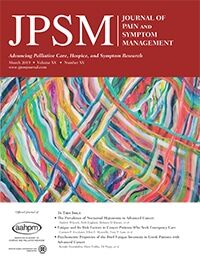
Shrenik Ostwal, MD FIPM CLF DipMental Health Muzumdar Shaw Medical Center Bangalore, India Shrenik Ostwal, MD, FIPM, CLF Dip’s journey into palliative care was unplanned—or perhaps it was destiny. Initially […]

Shrenik Ostwal, MD FIPM CLF DipMental Health Muzumdar Shaw Medical Center Bangalore, India Shrenik Ostwal, MD, FIPM, CLF Dip’s journey into palliative care was unplanned—or perhaps it was destiny. Initially […]

In the world of hospice and palliative care research, having access to trusted, high-quality information is key. That’s where open access publishing shines—removing barriers so anyone can explore impactful studies […]
What Is Program Signaling? A program signal is a way for applicants to proactively indicate interest to a limited number of fellowship programs during the application process. These signals serve […]

Stay up to date with the latest research and clinical insights in palliative care and pain management with the Journal of Pain and Symptom Management.
Advance your career in hospice and palliative care by becoming a member of AAHPM, which provides you with access to discounts, educational resources, publications, networking opportunities, and more.